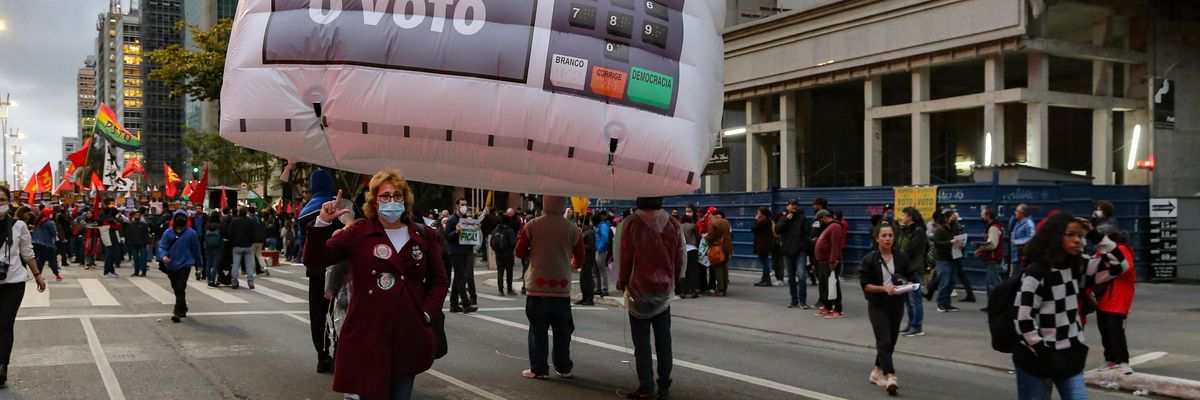With Brazil's Supreme Court under fire by backers of Brazilian President Jair Bolsonaro for upholding a judge's decision allowing the removal of false election claims from online platforms ahead of next week's presidential runoff, observers warned Tuesday that the country's voters are being bombarded with misinformation that some campaigners said resembles efforts by supporters of former U.S. President Donald Trump to subvert the 2020 election.
"Disinformation and hate speech online have taken over Brazilian politics, jeopardizing the integrity of the elections."
The Associated Pressreported Tuesday that social media misinformation includes claims that leftist frontrunner Luiz Inacio Lula da Silva plans to shut down churches if elected and that he wants to allow men use public school restrooms next to young girls. Meanwhile, da Silva backers have falsely accused Bolsonaro of confessing to cannibalism and pedophilia.
The torrent of fake online election news spurred Brazil's Superior Electoral Court (TSE) to empower Alexandre de Moraes--a Brazilian Supreme Court justice who also serves as president of the TSE--with unilateral power to compel tech companies to remove false posts. On Tuesday, the Supreme Court upheld the move.
"What is happening in Brazil on Facebook, on YouTube, and other platforms looks awfully similar to what was happening in the U.S. around the 2020 election," Vicky Wyatt, a campaign director at the San Francisco-based activist group SumOfUs, told the Associated Press. "An individual post might not have that much reach, but cumulatively over time, having this constant drip-drip has negative consequences."
A report published last week by the anti-corruption and human rights organization Global Witness revealed that YouTube approved 100% of Brazilian election misinformation ads submitted for approval, while Facebook accepted around half of such submissions.
"It's frankly shocking that these massive firms, with the technological prowess they clearly have, are unable to weed out such blatant disinformation being pushed onto their users. In the case of Facebook, not once, not twice, but three times some of the same ads have been approved," Global Witness senior adviser Jon Lloyd said in a statement.
"This key vote in Brazil has been marred by a huge spike in political violence, killings, threats, and kidnappings," he added. "It's a sad reality that this tense environment has been fueled online. The issues raised here are not simply what could or might be happening--it is happening."
After an unexpectedly close first-round finish that sparked widespread criticism of Brazilian presidential pollsters, the latest aggregate polling for the October 30 runoff shows da Silva with a narrow 4-point lead over Bolsonaro.
Da Silva leads Bolsonaro 50% to 43% in an IPEC poll published Monday. As Reutersnoted, "IPEC was one of several polling firms criticized for underestimating support for Bolsonaro in the first-round vote."
Bolsonaro, an open admirer of the former U.S.-backed 1964-85 military dictatorship in whose army he served as an officer, has warned he may not accept the results of the election in the likely event he loses.
On Monday, da Silva said during a press conference that if he wins the election, he hopes that Bolsonaro "will have a moment of sanity and phone me to accept the election result."
"If Bolsonaro loses and he wants to cry... I lost three elections," added the former two-term president. "Each time I lost, I went home. I didn't keep cursing, being agitated."
